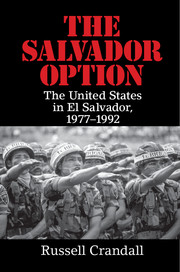Book contents
- Frontmatter
- Dedication
- Epigraph
- Contents
- List of Figures
- List of Organizations
- Acknowledgments
- 1 Introduction
- PART ONE EL SALVADOR IN THE COLD WAR
- PART TWO JIMMY CARTER
- PART THREE RONALD REAGAN
- 19 Reagan Arrives
- 20 Reagan and Salvador
- 21 El Mozote
- 22 Another Vietnam
- 23 Solidarity
- 24 Troop Cap and Certifying Human Rights
- 25 Reagan Gambles on Elections, 1982
- 26 The Shultz Doctrine
- 27 Human Rights
- 28 Henry Kissinger
- 29 Contras
- 30 “Elections Yes, Dialogue No,” 1984 Presidential Election
- 31 La Palma
- 32 Esquipulas
- 33 Counterinsurgency I
- 34 Counterinsurgency II
- 35 Zona Rosa
- 36 Air War
- 37 José Napoleón Duarte
- 38 Iran-Contra
- PART FOUR GEORGE H. W. BUSH
- PART FIVE POSTWAR
- Notes
- Bibliography
- Index
26 - The Shultz Doctrine
from PART THREE - RONALD REAGAN
Published online by Cambridge University Press: 05 June 2016
- Frontmatter
- Dedication
- Epigraph
- Contents
- List of Figures
- List of Organizations
- Acknowledgments
- 1 Introduction
- PART ONE EL SALVADOR IN THE COLD WAR
- PART TWO JIMMY CARTER
- PART THREE RONALD REAGAN
- 19 Reagan Arrives
- 20 Reagan and Salvador
- 21 El Mozote
- 22 Another Vietnam
- 23 Solidarity
- 24 Troop Cap and Certifying Human Rights
- 25 Reagan Gambles on Elections, 1982
- 26 The Shultz Doctrine
- 27 Human Rights
- 28 Henry Kissinger
- 29 Contras
- 30 “Elections Yes, Dialogue No,” 1984 Presidential Election
- 31 La Palma
- 32 Esquipulas
- 33 Counterinsurgency I
- 34 Counterinsurgency II
- 35 Zona Rosa
- 36 Air War
- 37 José Napoleón Duarte
- 38 Iran-Contra
- PART FOUR GEORGE H. W. BUSH
- PART FIVE POSTWAR
- Notes
- Bibliography
- Index
Summary
If you're going to have the ballot box free and open, there must be a shield behind which the people can participate.
– George Shultz, Secretary of State, citing Senator Henry Jackson, 1983El Salvador, my small country, is an example of a newborn democracy defending its blood…against a totalitarian Communist regime.
– Álvaro Magaña, Salvadoran president, to President Reagan, Washington, DC, 1983While not very apparent at the time, a significant shift in President Reagan's El Salvador policy came when George Shultz replaced Alexander Haig as secretary of state in July 1982. Asserting that American foreign policy no longer reflected “consistency, clarity, and steadiness of purpose,” Haig had serious differences of opinion with NSC Advisor William Clark and Defense Secretary Caspar Weinberger over Israel's 1982 incursion into Lebanon. It is also likely that White House Chief of Staff James A. Baker urged Haig to resign. Shultz served in the top diplomatic posting for six and a half years – the longest tenure since Dean Rusk in the 1960s.
Like his predecessor, Shultz saw the Central America issue as a clear case of global communist aggression, reflecting in his memoir: “The old forces of dictatorship had taken a new form: that of a command economy, a self-appointed elitist vanguard, and guerrilla warfare. Nicaragua had become its base, all of Central America its target. El Salvador was first on the list.” Unlike Haig, though, Shultz believed that there were deep structural forces at play in the conflict. He told a House subcommittee in March 1983 that there were “legitimate social, economic, and political grievances” fueling the conflict. Yet, given the continued external assistance to the FMLN from Cuba and the Soviet bloc, the United States could not simply focus on the underlying inequalities. Rather, the United States had to help alleviate suffering through political and economic reform as well as “counter a Communist strategy which seeks to aggravate and exploit these problems and so to seize power by force of arms.”
It appeared that Shultz had become the engagement strategy's proponent par excellence, developing a grin-and-bear-it attitude in balancing the contradictions in American foreign policy in Central America.
- Type
- Chapter
- Information
- The Salvador OptionThe United States in El Salvador, 1977–1992, pp. 275 - 286Publisher: Cambridge University PressPrint publication year: 2016



